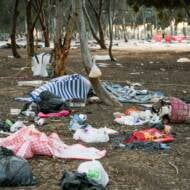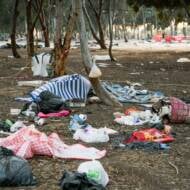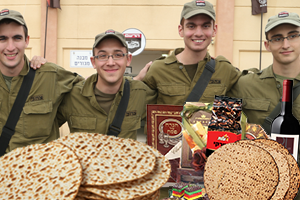Your cart is currently empty!

Nova Festival Survivors Take Their Stories on Campus Speaking Tour

Nova Festival Survivors Take Their Stories on Campus Speaking Tour

‘It’s been six months, and October 7 is fading out,’ said Yonathan Diller, one of the Nova survivors.
By Amelie Botbol, JNS
To counter the surge of antisemitism on U.S. campuses, ISRAEL-is, in partnership with the Seed The Dream Foundation, has launched the “Survived to Tell” tour during which six survivors of Hamas’s Oct. 7 Supernova music festival massacre will share their story with college students.
Yonathan Diller, Mazal Tazazo, Hadar Or Elmakias, Dor Kapah, Nehoray Machloof Levy and Shye Weinstein will describe their ordeals to a total of 1,200 students in 12 cities including Austin, Boulder, Los Angeles, Miami, Nashville and New Orleans.
“We initiated this tour to leverage the profound power of personal stories,” Omer Zimmerman, head of the Global Division at ISRAEL-is, a nongovernmental organization that aims to connect young Israelis with their peers worldwide, told JNS on Thursday.
“By bringing these stories to American campuses, we aim to challenge misconceptions and encourage a deeper, more compassionate insight into the complexities of human resilience and the universal longing for peace,” he said.
JNS spoke to Diller, who traveled to the U.S. in late October to tell his story at East Coast colleges including Harvard, Yale and MIT and who will now visit Colorado, Arizona and California.
“It’s been six months, and October 7 is fading out,” he said last week. “The world has already forgotten while our situation with antisemitism isn’t getting any better.
“It’s important to share our story but, more than that, the main point is telling people that this could happen in their backyard and remind them that hostages are still in Gaza,” Diller added.
On Oct. 7, Diller, who knew the organizers, volunteered to film the Supernova festival with his drone. He arrived at 4 a.m. with his friend Nadav.
The pair joined a group of more than 15 people and at 6 a.m. they all decided to get to the dance floor in time to watch the sunrise.
“Twenty-nine minutes later, we saw rockets fired from Gaza heading in our direction, hundreds of rockets, we didn’t hear any alarm in the open field with the music,” Diller recounted.
Diller and Nadav grabbed their belongings, helped their friends pack up, and got into their car to leave.
“There were people hiding under trees, under the stage and the bar. Some were panicking, others were filming. Each one was doing something different,” Diller said. “Nadav and I got into our car and we left while our friends went in other directions,” he added.
Most revelers headed north towards Kibbutz Be’eri, one of the hardest-hit areas in the Hamas attacks. Diller told Nadav to drive in the opposite direction, towards the nearby Kibbutz Re’im.
‘We helped her stop the bleeding’
“There was a lot of traffic. At some point all the cars were honking, we saw people running from that direction, screaming at us to turn around,” he said.
“Everyone was panicking. Then, we saw a car approach very slowly in a strange way. The girl in the car was trying to get out and she was so scared that she bumped into another car next to us,” Diller said.
Shani Gabay had just been shot by Hamas terrorists and was bleeding from her left knee.
“We helped her stop the bleeding. My friend went to get her water but by the time he came back, we heard automatic gunfire coming from Be’eri,” Diller said.
Gabay stayed with other partygoers, while Diller and Nadav left their car and went into the open fields.
“There were missiles from the left, an injured girl who came from the south and gunfire from the north. My intuition told me to go east,” Diller explained.
“We hid in the bed of a dried-up river in bushes and trees; bullets were flying on top of our heads, near my ear. I kept yelling at everyone around me to put their heads down. After a night of drinking and dancing the last thing people were was focused,” he remembered.
Diller opened the maps application on his phone to look for places to find refuge.
“I saw Sderot, Ofakim and all these villages in the south and something told me not to go there. Suddenly I saw [Moshav] Patish. I looked at the distance and measured it, it was around 17 kilometers away,” Diller said.
“I found myself with dozens of people walking there like an exodus for five hours with no food, no water, in the desert, with fire, missiles and explosions in the background, walking into the unknown,” he added.
When Diller arrived in Patish, an army spokesperson explained the situation and told him that everything would be okay. Diller lost four people in the massacre and one person, whom he went to high school with, was kidnapped and remains in Gaza.
“For me it’s like a mitzvah [religious commandment, to speak to people about Oct. 7], I’m on a mission. I give people a sense of hope and optimism. It feels good,” Diller said.
Tazazo went to the festival with two friends
Tazazo will also be sharing her story on the tour.
“We still have people there [in Gaza], at this moment one of the girls could be getting raped with no one to help her. This war isn’t about land or the Israelis and Palestinians, we are fighting for our safety,” she told JNS last week.
“I am not scared that they’d come and kill me, I am scared that terrorists will enter my house and rape me in front of my nine-year-old kid, because that’s what they do,” Tazazo said.
Tazazo traveled to South Africa on “Israeli Apartheid Week” and told her story at the University of Cape Town.
“I saw the hate, people wearing Hamas’s shirts. I asked him what they would do if someone came to their home and burned their baby; they replied that it [Israel] is not my country. They support this,” she said.
Tazazo went to the Supernova music festival with two friends, Daniel Cohen and Yohai Ben Zecharia.
“At 6:30 a.m., we were in the tent, we drank something and went to dance at sunrise,” Tazazo said.
“Then the rockets started raining upon us, the music stopped. At first, they told us to get down and protect [the back of] our heads with our hands. The security guards informed us that the party was over and that we needed to hurry,” she added.
Tazazo, who lives in Netivot, seven miles from the Gaza Strip, is used to rocket fire but this felt different, she said.
“It was something in the air, people started crying,” Tazazo said.
“At 7 a.m. we got into our car and decided to leave. There were three cars between ours and the main road, yet we were stuck in traffic. We waited for 30 minutes but no one moved. Then, we heard gunshots.”
The group tried driving into the fields but there were deep pits and their car fell into one of them.
“Gunshots started coming closer and got louder. We freaked out. We heard yelling in Arabic and we saw a policeman shot in the main road,” she said.
Ben Zecharia realized that the cars were not stuck in a traffic jam but were in fact abandoned.
‘All the people who hid under cars were killed’
“They [Hamas terrorists] came closer and we tried running to the main road by foot but they came from that direction as well. We started crawling from car to car with gunshots and rockets all around us,” Tazazo said.
She took cover in the bushes.
“All the people who hid under cars were killed,” she said.
“I saw many people with gunshot wounds, Daniel and Yohai were lying on their backs covered with leaves and trees. I put my face on the ground while protecting my head with my hands and started praying,” Tazazo said.
“A few seconds later, they [Hamas terrorists] came and they said in English, ‘Get up! Get up! Get up! You! You! You!’ They hit me on the head with their weapon. My hands were bleeding, the back of my white T-shirt was covered in blood,” she added.
When she got hit, Tazazo felt her head jump off the floor and back. She could not hear or see anything. Her brain was foggy. When she came back to herself, she felt terrorists putting ropes around her legs.
“I did not know what to do. I played dead and let them do whatever they wanted. Then, they started speaking with each other in Arabic and one of them came close to me, I held my breath,” Tazazo said.
“He picked up my face, looked at me and they left. I felt the ropes getting looser on my legs. At that moment, I thought I had died, I spoke to God and asked him if this was the end, I could not accept it but then I lost consciousness,” she continued.
“I woke up two hours later and saw Daniel and Yohai lying next to me, I knew they were no longer alive. They had both been shot.”
As Tazazo prayed for someone to rescue her, she felt a stranger land on her body. She did not move.
“In the beginning, I was sure that it was a terrorist. I don’t know how long I stopped breathing. Then I took a chance, turned around and saw a 22-year-old woman. She thought I was dead and freaked out,” Tazazo said.
The woman had witnessed Ben Zecharia and Cohen getting murdered along with her own friends. She survived. She grabbed Tazazo’s phone and sent their location to every open chat on WhatsApp. It was now 11:30 a.m.
“I heard weird noises that I did not recognize. I turned around again and saw that they [Hamas terrorists] had set all the bushes on fire. I waited until the fire came close to me, too close. I saw an abandoned car and ran. I preferred to get shot than be burned alive,” Tazazo said.
“I got into the backseat on the floor behind the driver’s seat, which was empty. I covered myself with a blanket while hearing gunfire all the while. It kept getting closer and farther away for hours,” she added.
Finally, at 3 p.m., a stranger approached the car, accompanied by the woman Tazazo had hidden with in the bushes, and all were taken to a safe place.
“I went to the hospital and had surgery. Yohai and Daniel were only identified after a week because they had burned together with the bushes,” Tazazo said.
“From that day on, I can’t stop thinking that we have girls right now being held by these monsters who enjoy suffering. I need the entire world to know,” she said.
Send Passover Packages to Needy Israeli Soldiers – Bring Them Joy!
We are honored to thank the young men and women of the IDF who risk their lives every day to protect the citizens of Israel. Since October 7th, soldiers have been on the battlefield for months – many are hoping to come home for Passover.
Join us in sending Passover food packages (and personal notes) to Israeli soldiers and their families.
Many soldiers spend the Passover holiday with needy families back home. The soldiers greatly appreciate your love and concern. Bring them Passover joy!
CLICK HERE TO SEND YOUR PACKAGE AND NOTE TO ISRAELI SOLDIERS!
The post Nova Festival Survivors Take Their Stories on Campus Speaking Tour first appeared on United with Israel.
United with Israel
